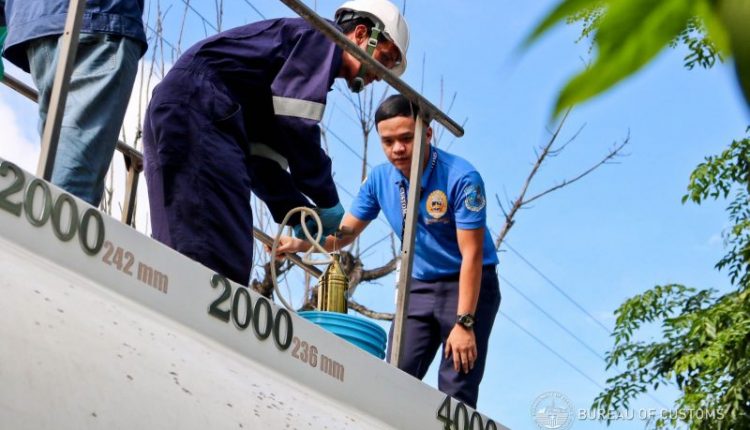‘FMP’ boosts govt. revenue, drive vs. smuggling
P127 billion revenue, 12 billion liters of fuel ‘marked’
THE government’s ‘fuel marking program’ (FMP) that finally got rolling under Bureau of Customs Commissioner Rey Leonardo Guerrero, marked its first year of implementation last month with more than 12 billion liters of fuel products measured and revenue of P126.55 billion collected.
Data released by the BOC showed that of the volume, the bulk consisted of diesel at 62 percent followed by gasoline at 37.43 percent and kerosene at only 0.51 percent.
As to location, 75 percent of the marking was conducted in Luzon, 20 percent in Mindanao and 5 percent in Visayas.
Since the trial run at the Seaol Mabini Terminal on September 4, 2019, the number of oil firms covered by the FMP has now risen to 20.
Of these, Petron Corp. has the highest marked volume with 2.79 billion liters or 23.12 percent, followed by Pilipinas Shell Petroleum Corp. with 2.44 billion liters or 20.21 percent.
Third in rank is Unioil Petroleum Philippines, Inc. with 1.29 billion liters or 10.77 percent, followed by Seaoil Philippines, Inc. with 1.02 billion liters or 8.5 percent and, Chevron Philippines, Inc. with 1.01 billion liters or 8.46 percent.
Other participating companies are Phoenix Petroleum, Insular Oil, Total, Filoil, Jetti, PTT, Marubeni, Micro Dragon, Warbucks, Golden Share, High Glory Subic, ERA1, SL Harbor, Jadelink and SL Gas.
The FMP has been a long-standing project of the government with the aim of further plugging tax loopholes while also combatting smuggling. The smuggling of oil products, together with tobacco products and vehicles have been cited by previous studies as comprising the bulk of the smuggling problem—and sources of tax leaks—in the Philippines.
For the BOC, the program is under the supervision of Deputy Commissioner for Enforcement Group, Atty. Teddy Raval.
For its second year of of implementation, the Department of Finance, the BOC and the Bureau of Internal Revenue (BIR) prepared Joint Memorandum Order (JMO) 1-2020.
The JMO prescribes the guidelines for the collection and disbursement of ‘fuel marking fee’ pegged at P0.06884 per liter of fuel subject to marking.
As a ‘self-generating’ tax project, the collected fees shall be used to defray the cost from the second to the fifth year of the program.
In preparation for the ‘field testing phase’ of the program, the BOC and the BIR have already conducted “covert sampling” of fuels from various retail stations in the National Capital Region, Central Luzon and Calabarzon.
The operation is aimed at detecting if oil products are smuggled or not.
Last September 16, 2020, both agencies also conducted compliance check targeting tank trucks exiting the Tipo Gate in Subic.
The field test guidelines shall also take into consideration the health and safety protocols issued by the national government in view of the COVID-19 pandemic.



